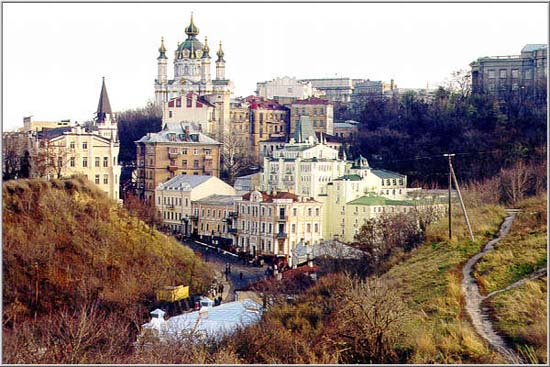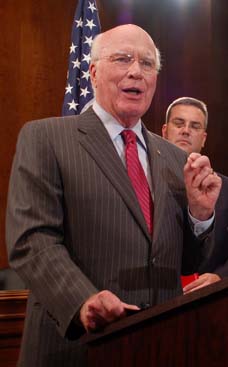
"In Ukraine, people I meet either think that I'm a secret agent (our language-training classes now include the phrase "I am not a spy") or that I was forced to come here, as if in some sort of mandatory military service. When I tell Ukrainians I actually chose this job, they are unconvinced. The idea that a college-educated, single female with no relatives in Eastern Europe would willingly give up two years of her life to teach English in the former Soviet Union is hard for them to fathom."
Claire St. Amant writes: I'm not sure where I meet more people who know less about what exactly the Peace Corps is-here in Ukraine or back home in the United States
Not Your Father's Peace Corps
By CLAIRE ST. AMANT
Tysmentsya, Ukraine
After graduating from college in 2008, I joined the Peace Corps and was sent to Ukraine. I'm not sure where I meet more people who know less about what exactly the Peace Corps is-here or back home. In Ukraine, people I meet either think that I'm a secret agent (our language-training classes now include the phrase "I am not a spy") or that I was forced to come here, as if in some sort of mandatory military service. When I tell Ukrainians I actually chose this job, they are unconvinced. The idea that a college-educated, single female with no relatives in Eastern Europe would willingly give up two years of her life to teach English in the former Soviet Union is hard for them to fathom.
You might think that Americans would know more about the program, but they are familiar with the Peace Corps only nominally. For many, it conjures up memories of John F. Kennedy asking America's youth to put aside their selfish ways and serve global humanity, not to mention images of earnest college graduates helping to dig wells in Africa. In fact, Africa is the default site of most Peace Corps iconography. Of course, the Peace Corps still operates there. But it has changed a great deal from the days of the New Frontier, even if its core mission remains the same: to provide skills where they were needed, to educate other cultures about America, and to educate Americans about other cultures.
Earlier this summer, President Barack Obama nominated Aaron Williams to be the corps' new director. Mr. Williams, who was a volunteer in the Dominican Republic from 1967 to 1970, has been tasked with doubling the size of the corps from its current 7,876 volunteers by 2011. Mr. Obama's proposed $373.4 million budget is a $33.4 million increase from last year.
In 1965, when missionaries and soldiers were practically the only developing-world travelers, the Peace Corps was twice today's size. Other things have changed too. The fall of the Iron Curtain and the advent of the Internet have propelled the program in a new direction.
To learn more about the roots of the corps, I phoned Jim Sheahan, a Sierra Leone volunteer from 1961 to 1963 who now lives in Atlanta. "You're calling me from Ukraine?" he asked incredulously. "The Peace Corps sure has changed since I was there," he noted, recalling the isolation from the rest of the world that volunteers used to experience. Mr. Sheahan had to make an advance appointment at the post office to telephone anyone abroad. "The charges were horrendous," he said, particularly "on a Peace Corps salary."
While most people associate the corps with, say, Uganda, Ukraine is now home to the largest Peace Corps contingent. These days, in fact, Morocco, Nicaragua, the Dominican Republic and Guatemala all host more volunteers than any sub-Saharan African country. As the industries of the corps have gradually expanded to include business development and information technology, so has the scope of countries served. After declaring independence in 1991, Ukraine was the first former Soviet republic to invite the corps into its country. Currently there are 247 members here, 17% of whom are older than 50. Instead of the stereotype of 20-somethings living in grass huts, volunteers are of all ages now. And Ron Tschetter, the director under the Bush administration, had his own ideas about how to encourage more applicants. His recruiting plan targeted the 50-plus demographic through the AARP and retired teachers' associations with a goal to increase the proportion of older volunteers to 15% from 5%. While he didn't succeed in shifting numbers program-wide, many of my colleagues in Ukraine could be my grandparents; they include academics and former business executives.
Volunteers often live in apartments while teaching English or working in business development. But indoor plumbing does not make a developed country. In Ukraine, water supplies routinely break down and central heating is a rarity. Double-digit inflation, gas shortages and poisoned presidential candidates are just a sampling of the woes of this teenage democracy. "This is not the end," my Ukrainian friend Svitlana reminds me while baking an elaborate meal for family and friends or planting rows of onions. Ukraine is definitely a work in progress. But things are improving in fits and starts.
In between hand-washing clothes and dishes and making meals from scratch, I teach fifth through 10th grade at the local school. While we have a computer lab that theoretically has Internet access, I spend most lessons without electricity. I teach new vocabulary through charades and practice spelling with Hangman tournaments. A great deal of my work is outside the classroom, talking with neighbors about American history over a cup of tea or helping friends gather potatoes from their kitchen gardens.
In the past, Peace Corps volunteers joined up to see the world and, of course, to do good. But today a significant portion of the American population has already been abroad by the time they have graduated from college, although rarely have they spent any time in the countries where the corps members work. When Mr. Sheahan worked in the corps' public affairs division in 1963, he booked returned volunteers on the Johnny Carson "Tonight Show" to promote the experience. Recruitment today is mostly done online. Potential volunteers can learn facts and figures about countries and programs, as well as look at pictures, watch videos and read blogs from current volunteers. I bookmarked the page in high school and would routinely check the site for new programs and the latest updates from the field. By the time I attended a recruiting event on my college campus, I had already started my online application.
Despite my longtime interest, I don't think I could have predicted what my life is like now. And now I'm sharing the experience with baby boomers. At a recent birthday party, we ate on the floor with pillows and a hodgepodge of plates and cups. Volunteers enjoy celebrating together, but our housing requirements allot only two plates and two forks per person. The scene wouldn't seem that unusual for a recent college grad, but the birthday boy was turning 64. "I never imagined a birthday like this in my 60s," mused John Jensen, a former soldier, business owner and blackjack dealer. He seemed to be enjoying himself.













